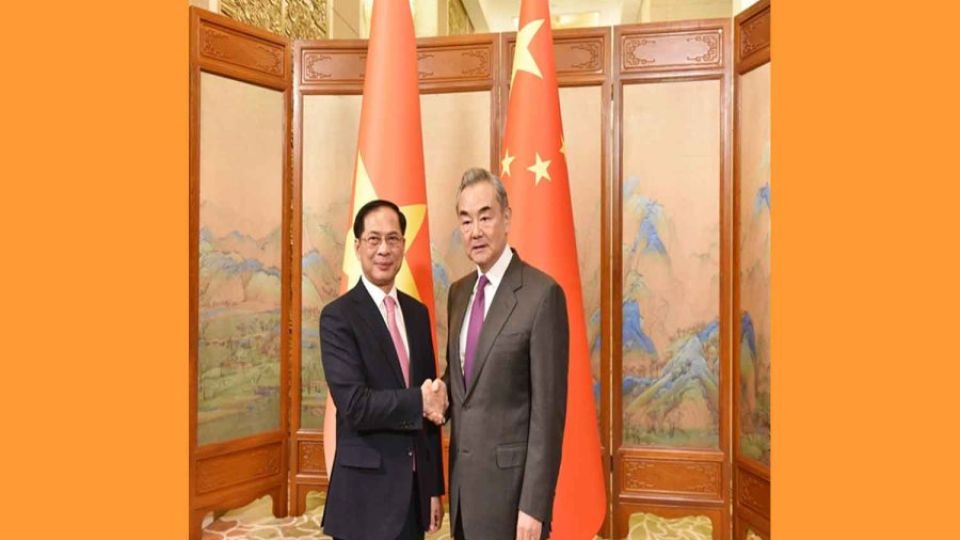December 11, 2024
BEIJING – Deputy Prime Minister and Minister of Foreign Affairs Bùi Thanh Sơn, and Politburo member, Director of the Office of the Communist Party of China (CPC) Central Committee’s Commission for Foreign Affairs and Minister of Foreign Affairs Wang Yi co-chaired the 16th meeting of the Việt Nam-China Steering Committee for Bilateral Cooperation in Beijing on Tuesday.
At the meeting, the two sides expressed their delight at the comprehensive development of cooperative relations between the two Parties and two countries since the 15th meeting held in Hà Nội on December 2023. Both sides engaged in in-depth discussions and agreed on several measures to effectively implement the common perceptions reached by senior leaders of the two countries to bring the bilateral relations into a new development phase.
Deputy PM, FM Sơn congratulated China on its significant achievements in comprehensive reform. He expressed his confidence that, under the leadership of the CPC Central Committee, with Party General Secretary and President Xi Jinping at its core, the Chinese people would successfully achieve the goals of the “Second Centennial.”
He reaffirmed that the Vietnamese Party and State attach great importance to strengthening and developing stable, healthy, and sustainable relations with China. This is a consistent principle, an objective requirement, a strategic choice, and a top priority in Việt Nam’s foreign policy of independence, self-reliance, multilateralisation and diversification of relations.
Meanwhile, Wang emphasised that China always regards Việt Nam as a priority in its neighborhood diplomacy. He wished and expressed his belief that, under the leadership of the Central Committee of the Communist Party of Việt Nam (CPV), led by General Secretary Tô Lâm, Việt Nam will achieve its goals, becoming a developed, high-income socialist-oriented country in the new era.
Both sides acknowledged the positive progress in the Việt Nam-China relations in recent times, particularly the enhanced high-level and multi-level exchanges, significant growth in economic, trade, investment, and tourism cooperation, breakthroughs in transport connectivity, and vibrant local and people-to-people exchanges.
Regarding the direction and focus of future exchanges and cooperation, both sides agreed to maintain high-level exchanges and enhance interactions via the Party channel and between the governments, parliaments, and fronts of Việt Nam and China. They emphasised the importance of the overall coordinating role of the Steering Committee for Bilateral Cooperation and agreed to strengthen mechanisms for exchanges and cooperation in diplomacy, defence, security, and between administrations at at all levels, sectors, localities and the people of both countries. They also committed to organising meaningful activities to celebrate the 75th founding anniversary of diplomatic relations and the “Year of Việt Nam-China Humanistic Exchange”, in 2025 while enhancing coordination in multilateral forums.
Sơn proposed accelerating railway connectivity, prioritising the implementation of three standard-gauge railway lines, namely Lào Cai – Hà Nội – Hải Phòng; Lạng Sơn – Hà Nội; and Móng Cái – Hạ Long – Hải Phòng. He also suggested restoring the international intermodal rail transport route between the two countries and facilitating flight slots for Vietnamese airlines. He stressed the importance of safe operations in the Ban Gioc (Việt Nam) – Detian (China) waterfall landscape site and called on China to further open its market for high-quality Vietnamese agricultural products and support the establishment of additional Vietnamese trade promotion offices in several Chinese localities.
Additionally, Sơn urged efforts to promote high-quality Chinese investment in Việt Nam, effectively implement Chinese-funded projects, and strengthen cooperation in areas such as agriculture, environmental protection, finance, science and technology, culture, and education. He also emphasised the need to explore new areas of cooperation to create fresh growth drivers for the bilateral relations.
Appreciating Việt Nam’s cooperation proposals, Wang affirmed that China treasures the enhancement of mutually beneficial collaboration across various fields. He expressed China’s willingness to expand imports of high-quality Vietnamese goods, increase cooperation in electricity trading, work together to address challenges in some Chinese-invested projects in Việt Nam, and encourage Chinese enterprises to invest in Việt Nam in line with the strengths and needs of both countries.
Wang proposed the two sides enhance connectivity between their development strategies, cooperate in building stable supply and production chains in the region, further strengthen collaboration for deeper, more effective progress and elevate the China – Việt Nam Comprehensive Strategic Cooperative Partnership to a new height, thus contributing practically to the building of a Việt Nam – China community with a shared future that carries strategic significance.
On maritime issues, the two sides engaged in candid discussions and agreed to seriously implement high-level common perceptions, better manage and resolve differences, and maintain peace and stability in the East Sea (known internationally as the South China Sea).
Sơn proposed both sides take the agreement on basic principles guiding the settlement of maritime issues between Việt Nam and China, and international law as the foundation. He called for mutual respect for each other’s sovereignty and legitimate interests, and effective utilisation of maritime negotiation mechanisms. He also stressed the importance of further promoting substantive cooperation at sea and properly addressing maritime issues, including matters related to fishing vessels and fishermen, in accordance with international law, especially the 1982 United Nations Convention on the Law of the Sea (UNCLOS), as well as in the spirit of friendship and the positive development momentum of the bilateral relations between the two Parties and countries.
Sơn also suggested China, together with ASEAN countries, expedite negotiations to soon reach an effective and substantive Code of Conduct (COC) in the East Sea.
On this occasion, the two sides exchanged the agreements between the two governments on cooperation in constructing three standard-gauge railway lines of Lào Cai – Hà Nội – Hải Phòng; Lạng Sơn – Hà Nội; and Móng Cái – Hạ Long – Hải Phòng.


